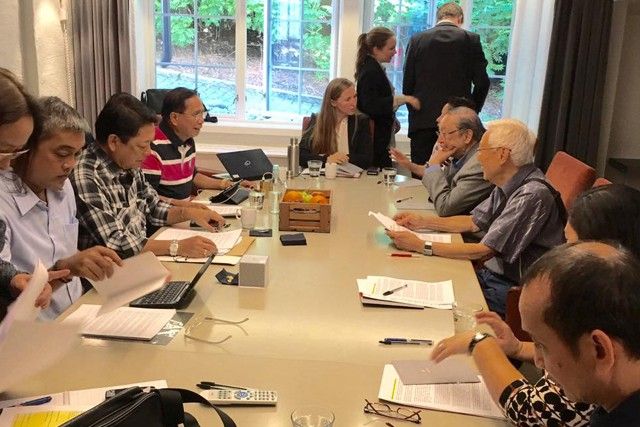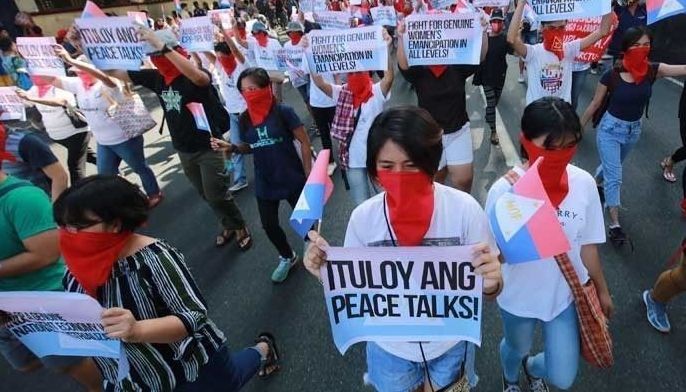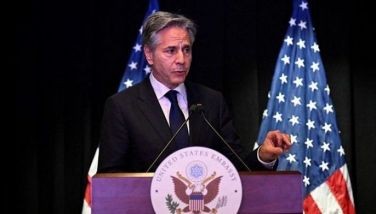CPP says terrorist tag on NDFP an attempt to 'overturn' progress of past peace talks

MANILA, Philippines (Updated 3:45 p.m., July 20) — The Anti-Terrorism Council's designation of the National Democratic Front as a terrorist organization is an attempt to "overturn" achievements reached through previous negotiations, the Communist Party of the Philippines said Monday.
In a statement, the CPP said the designation of the NDFP as terrorist group was "done with the manifest aim of further shutting all doors to peace negotiations as a means of resolving the roots of the civil war in the country."
"It is a devious attempt to overturn all past achievements attained through peace negotiations, including signed agreements covering human rights and international humanitarian law," it added.
The Anti-Terrorism Council issued Resolution Number 21 on June 23, —made it public only on Monday — designating the NDFP as a "terrorist organization/association."
The NDFP represents communist rebels in peace talks with the government. It also says on its website that it "[promotes] national unity for the revolutionary struggle", releases statements "on behalf of the revolutionary forces upon their authorization" and "conducts proto-diplomatic and relations work abroad" in support of the CPP-New People’s Army.
The panel, in earlier resolutions, tagged the CPP-NPA and 19 individuals believed to be members of its central committee as terrorists. Peace consultants have also been designated as terrorists.
NDFP: Needless nail on coffin of peace talks
In a statement, Julieta de Lima, interim chair of the NDFP negotiating panel, called the designation of the organization as an "antipeace act" that will make sure that no peace talks will take place during the Duterte administration, and possibly after that.
"It is a big waste for Duterte to throw away all that have been achieved in the prolonged and arduous peace negotiations, which has run on and off through the administrations of President Fidel Ramos, Joseph, Estrada, Gloria Macapagal-Arroyo and Benigno Aquino, Jr.," she said.
She said that among the gains of past talks were the Comprehensive Agreement on Human Rights and International Humanitarian Law as well as "substantial work" on the Comprehensive Agreement on Social and Economomic Reforms meant to institute reforms like agrarian reform that are believed to address the root cause of conflict between the government and communist rebels.
Bayan: Designation a stumbling block for peace talks
Renato Reyes Jr., secretary general of activist umbrella group Bayan, also said the designation “definitely places another stumbling block to peace negotiations under the current regime.”
Bayan is a legal activist group that government officials have repeatedly tagged as a communist front group. Bayan and other activist groups believe that peace talks will help adress the root causes of the decades-old conflict between the government and communist rebels.
President Rodrigo Duterte terminated peace negotiations with communist rebels in 2017. Amid renewed calls for the resumption of the peace talks, the Office of the Presidential Adviser on the Peace Process however asserted that localized peace negotiations and the so-called “whole-of-nation” approach to quelling the rebellion are already working.
RELATED: OPAPP: New panel to oversee localized 'peace engagements' with Reds
The government said in 2018 that past agreements have been suspended pending review by Duterte.
Prior to the termination of the talks, the government peace panel and the NDFP were working towards a draft agreement on socio-economic reforms covering issues like agrarian reform and land distribution as well as the development of the agricultural sector for food self-sufficiency.
Peace talks fell apart in 2017 over claims from both sides that the other is insincere in reaching a final peace deal.
'Without basis'
The CPP also asserted that the ATC’s previous resolutions designating them, the NPA, NDFP and 19 other individuals supposedly with links to them were baseless.
They said the terrorist tag on them has “a clear aim of misrepresenting and vilifying the deep aspirations of the people to end injustice and attain national and social liberation.”
It added that the move only shows how “terrorism” has been unjustly used as “catch-all legal net” against dissenters.
Bayan’s Reyes meanwhile said the designation highlights the need for the next administration to not be an “extension” of the Duterte government.
“[S]o that these legally questionable acts can be undone and peace negotiations for the benefit of the people will be allowed to continue and yield positive results,” he added.
The Anti-Terrorism Act’s Implementing Rules and Regulations provides that a verified request for delisting may be filed 15 days from the publication of the resolution. — Kristine Joy Patag
- Latest
- Trending































